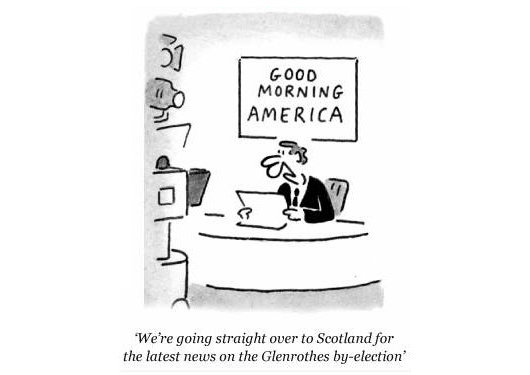Politics
About Andrew Cusack
 Writer, web designer, etc.; born in New York; educated in Argentina, Scotland, and South Africa; now based in London.
Writer, web designer, etc.; born in New York; educated in Argentina, Scotland, and South Africa; now based in London. read more
News
Blogs
Reviews & Periodicals
Arts & Design
World
France
Mitteleuropa
Knickerbockers
Argentina
The Levant
Africa
Cape of Good Hope
Netherlands
Scandinavia
Québec
India
Muscovy
Germany
Academica
Count von Stauffenberg: “We Live in a Society of Lemmings”
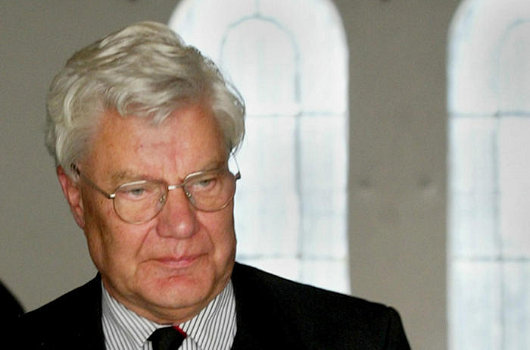
Count Franz Ludwig von Stauffenberg, the third son of Hitler’s would-be assassin Count Claus von Stauffenberg and brother to Gen. Berthold von Stauffenberg, recently spoke to the German magazine FOCUS about Germany’s ratification of the Lisbon Treaty. Stauffenberg, a father of four and grandfather of eight, has spent his life as an attorney and a politician for the Bavarian Christian Social Union party, serving in the Bundestag from 1976 to 1987 and as a Member of the European Parliament from 1984 to 1992.
FOCUS asked the Count about his participation in the German court challenge against the Lisbon Treaty.
“I see the way to [the Constitutional Court] as a last resort,” the Count said, “and had hoped that we could compel a re-think through an ordinary democratic manner, through argument, debate, and public pressure. This has totally failed. I’m not anti-European; I was long enough a CSU Member of the European Parliament. This Europe is no longer compatible with the basic structures of a democratic legal state.”
FOCUS: Has your case something to do with your experience as the son of the resistance fighter Count von Stauffenberg?
“No. My father expected that his children would … stand on their own as a man or woman. I didn’t go into politics from devout worship of my father, but because of the unsuccessful paths of my peers from the generation of 1968.”
FOCUS: Your action comes late. Why have you waited so long?
“In Brussels, there was no sudden seizure of power, but a systematic, persistent development, in which the Bundestag deputies, constantly obedient and even docile, incapacitated themselves. They see themselves as a reserve team for higher office rather than in their actual role as inspectors to reflect, as a counter force on equal footing.”
FOCUS: How can it be that so few see a risk in the Lisbon Treaty, and the rest should be so beaten with blindness?
“In Germany, almost no one wanted to hear concerns. We live in a society of lemmings.”
Link: Graf Stauffenberg: “Wir leben in einer Gesellschaft von Lemmingen” (In German)
The Prime Minister & His Wife

The Rt Hon Ian Douglas Smith & Mrs Smith, at home in Salisbury, Rhodesia.
‘German’ Poland vs. ‘Russian’ Poland
A curiosity of the 2007 Polish parliamentary election

THIS MAP displaying the results of the 2007 general election for the Polish parliament is overlaid with an outline of the nineteenth-century border between the German and Russian empires.
The areas formerly ruled by the German Kaiser tend to back the right-wing liberal Platforma Obywatelska (“Civic Platform”) party, while those formerly ruled by the Tsar tend to support the conservative Prawo i Sprawiedliwość (“Law and Justice”) party.
The green represents the centrist-agrarian Polish People’s Party, while the dark red represents the already-defunct “Left and Democrats” coalition.
Source: Strange Maps
Victory in Uruguay
Leftist president defies his own coalition, vetoes bill to legalize abortion.
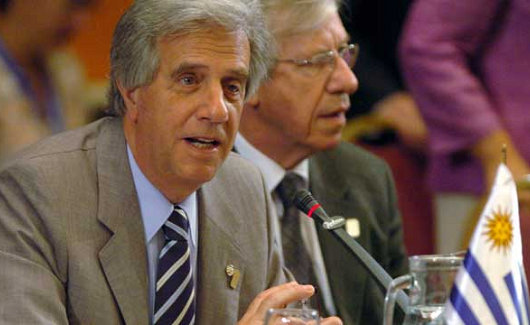
The President of Uruguay, Dr. Tabaré Vázquez, has vetoed a bill passed by the two chambers of the country’s congress that would overturn the ban on abortion. Pre-natal infanticide has been illegal in Uruguay since 1938, and the left-wing Frente Amplio coalition that has a congressional majority sought to enact one of the most permissive abortion laws in Latin America. While President Vázquez, an oncologist by training, is a member of the Frente Amplio party, his constituent group in the alliance is the Christian-Democratic Party which proclaims as part of its platform an “absolute respect for human rights”. The veto sends the bill back to the congress, where the Frente does not have the two-thirds majority necessary to override the veto.
A New Speaker in Quebec
Opposition parties unite to elect new President of the Assembly
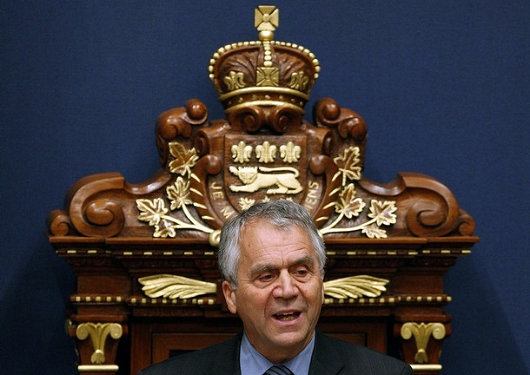
François Gendron, the longest-serving member of Quebec’s National Assembly, has been elected Speaker against the will of the province’s prime minister, Jean Charest. The ADQ (conservative, autonomist) and PQ (social-democratic, pro-independence) are opposition parties but combined have more seats than the Libéral (center-left/center-right) minority government Mr. Charest leads. Action democratique du Québec and the Parti Québécois united to select Mr. Gendron without consulting Mr. Charest, which the premier described as a “breach of confidence” that was the result of “subterfuge”. The vote took place by secret ballot, and it was only in the hours before that the opposition parties withdrew their respective candidates in favour of a united ticket for Gendron.
Ron Paul in The Economist
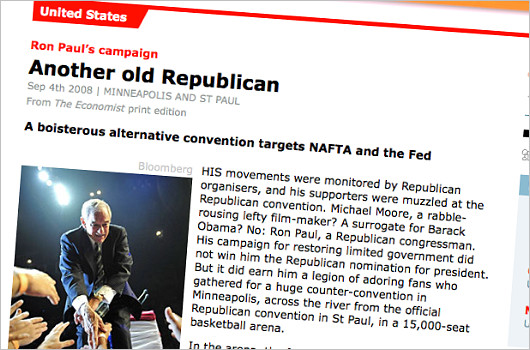
As self-styled newspapers go, The Economist is wrong on most things — furthermore it broadcasts its Establishment errors with an undeserved arrogance and a haughty tone. (For our hebdomadal reading, we prefer another publication). Nonetheless, we cannot resist giving credit where credit is due, and The Economist recently published a short, relatively balanced piece on Ron Paul’s counter-convention in Minneapolis. It is reproduced here:
Propaganda Fide

Cheers to the unknown wag who created this delightful poster, parodying the Obama “HOPE” posters.
High Drama in Argentina’s Halls of Power

IT IS AN age-old question: what happens when an irresistible force meets an immovable object? The force in question is the farming community of Argentina, once among the agricultural powerhouses of the world, and the object is the country’s slippery presidential couple, President Cristina Fernández de Kirchner and her husband (and predecessor in the top job) Néstor Kirchner. From all the way back in March, the Kirchners have been locked in a bitter dispute with the farming sector of the country since the presidential couple unilaterally imposed a massive tax on soy exports.
The Kirchners deride the farmers as “oligarchs” and claim that the exorbitant tax on one of Argentina’s most successful commercial sectors will be redistributed to the poor. Of course it would be irresponsible to simply take from the haves and give to the have-nots; the money raised would only go to the deserving poor, namely those who happen to support the Kirchner regime. Along the way, every cog in the machine will take his fair share, with a respectable amount left over to fatten the calves (metaphorically speaking) of the Kirchnerite street operators who quite openly buy votes during election time and pay union members to show up at pro-government rallies in between.

Argentine farmers protesting the Kirchner soy tax.
Humiliating Defeat in the Heart of Labour

Well, it looks like they’ve done it: the SNP have slashed a Labour majority of over 13,000 to win the parliamentary seat of Glasgow East with a new Nationalist majority of just 365 votes. The Conservatives and the Liberal Democrats came third and fourth, but with 1,693 and 915 votes respectively, this was very much a two-pony race between Labour’s Margaret Curran (above, left) and the SNP’s John Mason (above, right).
While Glasgow East is deep in the heart of Labour territory, pundits were saying this was going to be a close one. The defection of Catholics is likely to have played a significant role in Labour’s defeat. In the past year, Labour have legalized the creation of animal-human hybrids as well as siblings designed solely for the harvesting of their organs, and this campaign has been vociferously opposed by Catholics around the Union. Mr. Mason made sure to thank those who had prayed for him in his victory speech.
“This is an absolutely remarkable result,” said Angus Robertson, SNP leader at Westminster, “it’s Labour’s third-safest seat — rock-solid territory. Now it’s over. People have had enough and Gordon Brown had better listen because at the next Westminster election the SNP is coming.”
This is the second “safe” Labour seat lost in a by-election in just three months.

Catholic backlash sinks Labour in Glasgow East
Cranmer:
SNP victory in Glasgow East – the Christians won it
the Daily Telegraph:
Labour suffers humiliating defeat as SNP celebrates
the Times:
Nightmare result for Gordon Brown as SNP triumph over Labour in Glasgow East
the Guardian:
Glasgow East byelection victory adds remarkable new chapter to SNP history
Google News:
Glasgow East
Uribe for the White House?

Daniel Hannan, the best MEP blogger there is, thinks that Álvaro Uribe should take over the reins of the United States when he finishes his second term as President of Colombia. As Mr. Hannan points out, Uribe “has a better record on defeating terrorism than anyone else in the world, he’s a successful free marketer, and he’s the most pro-US leader in the Western Hemisphere.” Sadly, being pro-US is usually a bad sign in world leaders these days, but President Uribe is the exception that tests the rule.
President Uribe currently enjoys a 90% approval rating; President Bush hovers around 30%, while the United States Congress has reached a whopping 9% approval rating.
Stat Belgium, stat Europa

The Crown of Disenchantment
Over in Great Britain, the House of Commons recently passed the Human Fertilisation and Embryology Bill which, among other things, keeps the time limit on abortions at twenty-four weeks (in spite a hope that it would be lowered), authorizes the creation of “savior siblings (brothers and sisters deliberately created in a lab solely for their organs to be harvested for use by the already-born), and allows for the creation of animal-human hybrids. The British human rights activist James Mawdsley, famously jailed for over a year by the military junta in Burma, has asked opponents of the HFE Bill to sign a petition to Queen Elizabeth II imploring her to withhold the royal assent necessary for the Bill to become law.
Under the British constitution, a bill only becomes a law when it has received the assent of all three components of the British Parliament: the Commons, the Lords, and the Crown. The last time the Crown withheld consent was in 1708 when Queen Anne refused to sign the Scottish Militia Bill. Since that time, it has been an unspoken convention that should the Crown object to a piece of legislation, it should privately inform its ministers before the legislation is voted upon in order for it to be withdrawn, thus preventing the scandal of the Crown and the Commons appearing to be in disagreement. Despite this convention, however, the Crown still has the right to withhold consent, but merely neglects to exercise that right.
While the Crown has faded to near-irrelevance in the everyday workings of the British government, this was certainly not always the case, and the Crown has intervened in politics several times since Queen Anne’s refusal of assent in 1708. What follows are but a few twentieth-century examples.
In 1925, William Mackenzie King was Prime Minister of Canada with 99 Liberal MPs to the Conservative opposition’s 116. He was able to do this by forming a minority government with the support of the 24 MPs of the Progressive Party. A year later, Liberal MPs were implicated in a bribery scandal and so the Progressives having withdrawn their support for the minority government. As parliament debated a motion to censure the MPs involved, the Prime Minister asked Lord Byng, the Governor-General of Canada (and thus the direct representative of the Crown), to dissolve parliament and call a general election.
Lord Byng did not want it to appear that the Crown was allowing parliament to be dissolved in order to prevent the censure of government MPs and so used the royal prerogative and refused to call an election. The Conservatives, as the largest party in parliament (Lord Byng argued), should have a chance at forming a government instead. The Governor-General invited Arthur Meighen, leader of the Conservatives, to form a government instead, and Meighen agreed. This, in turn, infuriated not only the Liberals but also the Progressives, throwing the middle-man back into the Liberal camp. Meighen put his government up to a vote of confidence, lost it by one vote, and so resigned and asked the Governor-General to dissolve parliament and call an election, which Lord Byng duly did.
“I have to await the verdict of history to prove my having adopted a wrong course,” Lord Byng wrote, “and this I do with an easy conscience that, right or wrong, I have acted in the interests of Canada and implicated no one else in my decision.”
In 1931, when the Labour Prime Minister Ramsay MacDonald submitted his resignation to the King, George V took the unprecedented step of asking MacDonald to form a national government with the support of Conservatives and Liberal Members of Parliament. MacDonald lasted as Prime Minister until 1935, but Great Britain would not be governed by a single-party government again until 1945.
More recently, the Crown controversially intervened in Australian politics in 1975. Gough Whitlam’s Labor government commanded a majority in the House of Representatives but the opposition coalition of the Liberals and the National Country Party held sway in the Senate. It is traditional in Westminster-style systems that if a money supply bill fails to pass, the government falls with it. The Senate refused to vote on the annual Budget, in hopes of provoking Whitlam into calling a new election. Whitlam stubbornly refused, and the impasse grew as the weeks passed and, with no budget approved, it looked like the government of Australia would not be able to meet its financial obligations for the year.
Finally, the Governor-General of Australia, Sir John Kerr, used the royal prerogative to dismiss Whitlam as Prime Minister, asked the opposition leader Malcolm Fraser to take the job. Fraser formed a caretaker government solely to pass the appropriations bill then immediately called a new election which his own Liberal/National Country coalition won handily.
Such royal interventions, however, are not limited to the English-speaking world. Belgium’s King Baudouin I, a Charismatic Catholic and friend of Francisco Franco, famously refused to give assent to a bill liberalizing the kingdom’s abortion laws. The Prime Minister, Wilfred Martens, simply had the King declared temporarily unable to reign and the Government signed the Bill in place of the King (as is provided in the Belgian Constitution). Two days later, the Government declared the King able to reign once more, and all was back to normal (except for the unborn children killed thereafter, of course).
One of the great benefits of a monarchy is this: that the Crown act as a source of authority, free from democratic accountability, who is capable of blocking any egregious acts which the government of the day may attempt. The HFE Bill is the perfect example of a bill the Crown ought to reject, for the benefit of all the kingdom, most especially the unborn. Yet we can reasonably assume that Elizabeth II will grant her assent to this travesty of law nonetheless, as the current occupant of the throne has (ironically) so thoroughly and woefully imbibed the democratic spirit that she knows not how to fulfill her purpose and duty as Queen. (It is important to note that in neither the King-Byng affair nor the Whitlam-Kerr affair was the Governor General acting on the orders of the actual person who was the Crown at the time, but rather on their dutiful instinct as the local incarnation thereof). It is disappointing to those who are unflinching in their attempts to defend the British Monarchy that the British Monarchy insists on participating in, and sometimes urging on, the very sort of wickedness which we look to the Crown to protect us from. Alas, so far we have looked in vain.
Christ at the heart of Quebec
Quebec, la belle province, was once a land as Christ-haunted as Flannery O’Connor’s American South, with classical parish churches at the heart of towns and cities, and crucifixes in classrooms, courtrooms, and most prominently looking down from on high above the Speaker’s Chair in the Parliament of Quebec. (Alfred Hitchcock’s “I Confess” superbly depicts Quebec’s Catholic society in the 1950s). While the so-called “Quiet Revolution” of the 1960s created an altogether more secularized modern society, robbing the Quebecois of their cultural and religious heritage, the crucifix in parliament remained, most recently challenged by the Bouchard-Taylor report, released this week.
Quebec has undergone an identity crisis concurrent with its latest wave of immigration, most of these immigrants hailing from Africa and the Middle East. Whereas there is no dominant ethnic group or ethnic-based identity in English-speaking Canada (descendants of Britons comprising 34% of the population), in Quebec 77% of the population are ethnic French-Canadians. Of those Quebecois whose primary language is French, 71.7% claim that their society is “overly tolerant” with regard to immigration (a figure that drops to 35.2% for those whose primary language is not French).
The specially-commissioned Bouchard-Taylor report makes a number of recommendations of how to better integrate the newer immigrants, and repeatedly calls for the removal of the crucifix from parliament as well as an end to all public prayers at government functions.
Happily, the National Assembly of Quebec has unanimously passed a resolution stating that the crucifix will stay where it is. The motion was proposed by the Premier of Quebec, Mr. Jean Charest, and Mr. Charest’s Liberals were joined by the official opposition, the Action democratique de Quebec, and the separatist Parti Quebecois.
“We cannot erase our history,” Premier Charest said. “The crucifix is about 350 years of history in Quebec that none of us are ever going to erase, and of a very strong presence, in particular of the Catholic Church. And that’s our reality. And those who come to Quebec are joining a society where that history is now something that is part of our story.”
The Bouchard-Taylor report, however, draws some altogether different conclusions. “Catholicism has left an indelible mark on Québec’s history,” the report concedes. “Traces of it are all around us. Under the principle of the neutrality of the State, religious displays linked to the functioning of public institutions should be abandoned. Thus, we do not believe that the crucifix in the National Assembly and the prayers that precede municipal council meetings have their place in a secular State. In both instances, public institutions are associated with a single religious affiliation rather than addressing themselves to all citizens.”
“That being the case,” the report continues, mixing common sense with liberal cant, “it would be absurd to want to extend this rule of neutrality to all historic signs that no longer fulfil an obvious religious function, e.g. the cross on Mont-Royal or the crosses on old buildings converted to secular uses. The same is true of Québec toponymy, which is largely inspired by the calendar of the saints. Quebecers’ common sense will surely prevail in this respect.”
(Rather absurdly, the Societé Saint-Jean-Baptiste de Montréal, a cultural nationalist group named after the province’s patron, St. John the Baptist, has stated in response to the report that it wholly supports the concept of a secular Quebec and that prayer has no place in civic forums.)
It would be more heartening if the National Assembly’s refusal to remove the crucifix were evidence of a renewed commitment to keep Christianity as the governing principle of Quebec society, but sadly Our Lord has been reduced to a cultural relic of great importance. However, the mere fact that it is being left alone, despite many challenges, gives us hope. So does the surprising success of Quebec’s ADQ party, which came from almost nowhere to within a few breaths of actually forming the government at the last provincial election.
Should the ADQistes capture the premiership at the next election they will have succeeded in bringing moderate conservative government to one of the New World’s most secularized bailiwicks. Conservatives, having once written off the province entirely, should definitely keep Quebec on our list of “ones to watch”.
[First published in Taki’s Magazine]
Which Scots conservatism?
FOR THOSE WHO haven’t been keeping up with Caledonian affairs, Scottish independence has been brought onto the agenda by the victory of the anti-unionist, pro-independence Scottish National Party in the general election for the Scottish Parliament last year. The SNP victory comes after about half a century of solid domination of Scottish politics by the Labour party (now in regional opposition in Edinburgh, but still in power at the British parliament in Westminster). Yet an important portion of the electorate, while willing to vote the SNP into power — or at least to vote Scottish Labour out of power — have proved more reticent when it comes to the actual matter of ending the 300-year union between England and Scotland. While the SNP is riding high in Holyrood (the seat of the Scottish Parliament), support for Scottish independence is at its lowest since the discovery of North Sea oil.
This may seem like something of a contradiction, but Scottish voters are just trying to make the best of a tricky situation. Labour have proved unpopular both for national reasons (the war in Iraq particularly and Tony Blair in general) and for local reasons (Scottish Labour’s mismanagement during ten years in power at Holyrood and the presumption the Labour clique have that they are Scotland’s natural rulers and how dare anyone think otherwise). Of the five parties in the Scottish Parliament, the Nationalists are the only purely Scottish party — with Labour, the Conservatives, the Liberal Democrats, and the Greens all having either superior (or in the Greens’ case, co-equal) bodies in London. The best way of kicking out Labour was to vote SNP, and enough Scots thought it was worthwhile this time around.
That the Nationalists are a broad-based party has proved a great advantage. Beyond the central issue of their proposal to make Scotland independent, the SNP’s policies are, roughly-speaking, pro-business center-left. At the same time, their student federation is officially socialist, and they receive a fair amount of conservative support because conservatives tend to of a somewhat nationalist strain — and because the Scottish Conservatives give the appearance that they are more than comfortable to simply sit in Holyrood, collect their parliamentary salaries, and twiddle their thumbs. The Conservatives have always been a London-centric party anyhow, and under David Cameron it has become even more clear that it is a rural conservative party which exists in the hope of placing respectable metropolitan liberals in power. Faced with the choice of three liberal parties — the SNP, the Lib Dems, and the Conservatives — and pseudo-socialist Labour, Scots have made a sensible decision by choosing the liberal party which cares most for Scotland: the Nationalists.
But what, again, of this divergence: a party in government for which independence is its foremost purpose and a people who still seem content on (in some shape or form) maintaining the Union? Some in the opposition parties have seen an opportunity in this contradiction and have called for a referendum on independence to be held now; independence would almost (but only almost) certainly be defeated. Wendy Alexander, the Scottish Labour leader, surprisingly lent her support this idea before being forced by her superiors in London to issue a “clarification” opposing the idea. Those who support the continued union between Scotland and England, Wales & Northern Ireland would be wise to push for a referendum at the nearest moment and pull the rug from beneath the independence lobby.
But is the Union worth preserving? Ought conservative Scots to support the continuation of the Union or a move to independence? A unionist conservative might claim that by our very nature as conservatives we ought to support the status-quo and be wary of such far-reaching radical ideas such as ending three centuries of union. To which, of course, the nationalist conservative replies by asking why Scotland should be ruled by a London-based government intent on social and cultural revolution and the overthrow of all tradition. To which the unionist conservative replies that an independent Scottish government is just as likely to be the enemy of all that is good and holy as the London government. And so on and so forth.
Right-thinking Scots who condescend to involve themselves in politics are currently divided between two political parties — the Scottish Nationalists and the Scottish Conservatives — and that this hampers the cause of tradition, order, and liberty in Scotland.
What, then, should be done? The Scottish Conservative party is an inherently flawed vehicle for the advancement of conservatism in Scotland. The party itself only dates to 1965; before then there was a loose association of unionist elected officials who ran under various banners — Liberal Unionist, Scottish Unionist, Progressive, Independent, National Liberal, etc. It was only in that year that the Scottish Unionist Association decided to become the Scottish Conservative & Unionist Party, the official Scottish branch of the (traditionally English) Conservative & Unionist party. The fortunes of the Scottish Conservatives have gone downhill ever since, and there is a very strong cultural bias (sometimes even hatred) of “the Tories” in general that hurts the Scottish party.
There are two main options at hand. The first is that the Scottish Conservatives completely divorce themselves from the English & Welsh party, undergo a complete “re-branding” and transformation. The Conservative name will have to be dumped and there must be a clear indication that the party’s officials are willing to put Scotland’s interest first and foremost both at Westminster and in Holyrood. The disadvantage is that any new identity will still be tarred with the Tory brush and be denigrated as English lackeys.
The second option is for the party simply to be dissolved and for unionist conservatives to join their nationalist conservative confrères in the Scottish Nationalist Party to form a united bloc of sensible people in the party. The disadvantage of this option is that the center-left leadership of the SNP will have an obvious advantage in being able to shut out any former Tories from party positions. The anti-Tory cultural bias is so strong that expulsion may even be considered.
Still, if the SNP wants to be both the party of the Scottish people and the party of Scottish government it would be wise to fulfill two tasks: wooing Scottish Conservatives and reacting to the electorate’s reticence towards full independence. Despite the SNP having 47 seats in Holyrood to the Conservatives’ 17, the Scottish Conservatives are believed to have a larger membership than the Nationalists. Feet on the ground are one of the more important factors in winning elections, and the end of the Scottish Conservative Party could shift a great number of party activists into the SNP camp. On the second point, polls show the Scots voting down independence but being nonetheless dissatisfied with the state of the Union. Rather than the current process of revisiting which powers are “reserved” (kept in London) and which are “devolved” (decided at Holyrood) every few years, it might be better to seek a new concept of union altogether, with the preponderance of governmental power shifted from Whitehall to Belfast, Edinburgh, Cardiff, and English MPs voting on English affairs at Westminster (though some have suggested creating a new English parliament).
The danger here is that any significant reappraisal of the constitutional framework of the Union at this moment might result in any or all of the following: 1) even more power for the government; 2) a step towards the total dissolution of the Union; 3) republican moves towards the abolition of the monarchy. Unionist conservatives ought to oppose all three and nationalist conservatives should at least join in opposing further centralization and the abolition of the Crown, both of which would result in removing any checks on the power of Britain’s political class.
Indeed, perhaps that is the cause around which conservatives of all stripes should unite: opposition to the political class which has seized control of almost all the major institutions of public life in Great Britain and which guards its power jealously. The current political class, which replaced a more multifaceted Establishment (consisting of the commercial class, aristocrats, bishops, do-gooding campaigners, skillful parliamentarians, trade unionists, and the British officer corps) consists almost wholly of boring people who are carbon copies of one another. The fact that no political party currently opposes this political class and its consensus is likely the reason why Britons are so apathetic and unlikely to vote in elections. Peter Hitchens has suggested the first thing that must happen for this situation to change is for the Conservative Party to self-destruct and cease to exist. There are still in Britain today many deeply-conservative people who nonetheless vote Labour (or Lib Dem or SNP) because they feel culturally obliged to, or because they have inherited the bias against the Conservatives. Hitchens posits that the existence of the Conservative Party and the cultural hatred of it are the only factors which keep Labour going as a single party. If the Conservatives collapse, then Labour is soon to follow it (in this hypothesis) and once these two deep-seated “brands” are destroyed, there is finally the possibility of a truly conservative political force emerging; union-wide, not just in Scotland.
[First published in Taki’s Magazine]
Norn Iron Unites

What issue could be so important that it unites Northern Ireland’s four main political parties? The leaders of the Democratic Unionist Party, Sinn Féin, the Social Democratic & Labour Party, and the Ulster Unionist Party (to name the parties, from largest to smallest in number of votes) have written to Westminster MPs urging them to oppose the extension of the 1967 Abortion Act to Northern Ireland. Northern Ireland was exempt from the Act legalizing abortion in Great Britain because at the time it had its own parliament handling regional issues. The six Irish counties that have remained in the Union are the most strongly anti-abortion part of the United Kingdom.
Q&A: Lady Cochrane Sursock

In a fascinating interview, Canadian journalist and Monocle editor-in-chief Tyler Brûlé talks with Lady Yvonne Cochrane, “doyenne of the Christian East”, discussing Beirut past, Beirut present, and Beirut future.
Update: She is actually Yvonne, Lady Cochrane Sursock, not Lady Yvonne Cochrane as Monocle styles her. Hat tip to Mr. Bond.
New Yorker Elected Mayor of London

Congratulations to that most-honoured son of the Empire State, Mr. Alexander Boris de Pfeffel Johnson MP, more commonly known as Boris, on his election to the mayoralty of Greater London. Mr. Johnson was born on these sacred shores some forty-four years ago on a pleasant June day. Boris has politics in the blood as his father Stanley is a former Conservative MEP, but let us hope he does not take after his great-grandfather, Ali Kemal Bey, who made enough unfortunate decisions during his brief tenure as interior minister of the Ottoman Empire that he was knicked from the barber shop of the rather-smart Tokatlian Hotel in Constantinople and lynched shortly thereafter.
Strangely enough, this is not exactly the closest connection New York and London have ever had. Sir Gilbert Heathcote, 1st Baronet was Lord Mayor of London in 1710 while his brother Caleb Heathcote was Mayor of the City of New York, exhibiting how interconnected our transatlantic British world was in those days. Caleb Heathcote was also Lord of the Manor of Scarsdale, which is just five minutes north of here on the train. Created in 1703, Scarsdale was the last manor granted in the entire British Empire. There were about a dozen manorial lordships here in New York, bringing the proud heritage of feudalism to the New World. The Manor of Gardiner’s Island survives to this day as the only manor in America in which the land is still entirely owned by the descendants.
The bulk of manorial privileges (incorporating the pre-existing patroonships from the olden Dutch days) were, alas, abolished in the 1840s, with the final holdouts taken care of in some legislation of 1911, but the Lord of the Manor of Pelham was presented with a fatted calf each St. John’s Day from the City Council of New Rochelle (honoring the Huguenots’ agreement purchasing the land from the Pells) well into the twentieth century.
The Heathcote name survives, in Derbyshire I believe, but not in America. Caleb Heathcote married the daughter of Col. William Smith, Chief Justice of the Province of New York, but had only daughters.
And you thought subsidising the poor was bad…
Millions of tax dollars taken from hard-working Americans are going to subsidise one of the wealthiest school districts in the country
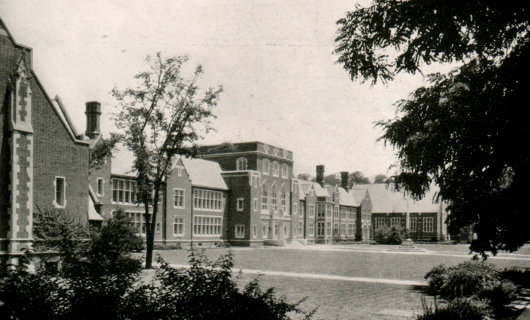
The Bronxville School (as it is called, since all grades from kindergarten to 12th are in the same building) ostensibly has a number of things going for it. It has a rather splendid collegiate gothic building in an excellent setting in one of the handsomest villages in all of the Empire State. Its school district is a mere square-mile, meaning most students can walk to school and it doesn’t even have a bus system. It has a private foundation funded independently by parents and alumni to support the school. What more could a public school possibly need?
Well, according to the geniuses down in Washington, D.C., $5.4 million in federal grants. The school, you see, is built on a site which frequently floods. Our main street in Bronxville is called Pondfield Road for a reason: the field with the pond is the open space where the school now stands. It’s been flooding for decades and so floods should come as no surprise. The nor’easter that blew through town a year ago flooded the school severely, closing it for over a week. The flooding was particularly bad during the last nor’easter because the school had spent a great deal of money (privately-raised, not from the public purse) to replace its natural football field with a lower-maintenance fake turf alternative. They did this instead of saving the money for, oh, say, one of those floods that happens every so often.
The money has been secured from the Federal Emergency Management Agency by our congresswoman, Nita Lowey (D). “When a natural disaster occurs, the federal government has a responsibility to help communities recover,” said Lowey, who neglected to provide any legal or moral backing for such an untruthful and baseless claim.
The school district of one of the wealthiest communities in the country is filching off the hard-working people of America in order to clean up the mess that is a direct result of its own poor spending decisions and inability to plan properly. Is there no shame?
Search
Instagram: @andcusack
Click here for my Instagram photos.Most Recent Posts
- Waarburg October 2, 2024
- A Prize for the General September 23, 2024
- Articles of Note: 17 September 2024 September 17, 2024
- Equality September 16, 2024
- Rough Notes of Kinderhook September 13, 2024
Most Recent Comments
Book Wishlist
Monthly Archives
Categories

